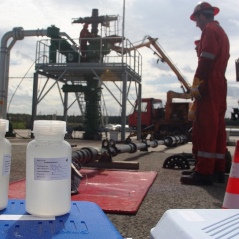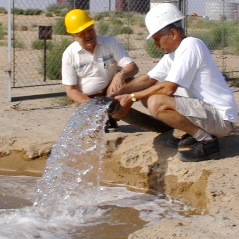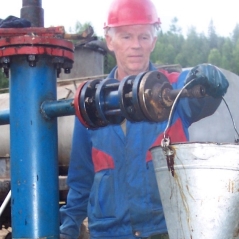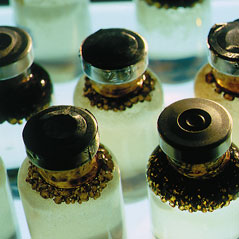Microbiological investigations specifically related to oil and gas reservoirs
Microorganisms frequently play an important role in hydrocarbon reservoirs and can cause technical problems under unfavourable conditions. The ongoing microbial processes are often very complex and are difficult to influence due to the structure and size of the matrix. Avoidance of secondary contamination and early recognition and intervention in case of damages are therefore all the more important.
Typical technical accident caused by micro-organisms:
- Microbially influenced corrosion (MIC) at pipelines, technical installations or sheet pile walls
- Quality loss by generation of hydrogen sulphide (souring)
- Plugging at wellbore bottomhole or surface installations, e.g. at filters or heat exchangers by microbial products (FeS) or biofilms
- Precipitation, plaque formation, souring
- Decrease of formation permeability
- Collapse of drilling mud or other chemical additives
In all cases, the investigations require a microbiological observation of the specific site conditions. Special and tested test media and processes guarantee a reliable analysis and typifying of the occurring organisms. Moreover, investigations of growth enable an application oriented, extensive characterisation of the proven bacteria population. These analyses are supplemented by modern molecular biological processes.
We offer you specially adapted microbiological investigations under conditions relevant to practice for samples containing water, oil or solids from reservoir formations or subsurface installations.Services:
- Sampling of liquid and solid material from geologic structures or technical facilities
- Investigation of samples for all relevant micro-organisms
- Biochemical tests to quantify consumption of specific substances, e.g. hydrogen, hydrocarbons and production of critical components, e.g. hydrogen suphide
- Quantification of bacterial population and biochemical activity under specific field conditions (salinity, temperature, pressure ,chemical composition)
- Specification of bacterial groups with molecular and biochemical methods
- Root cause analysis of microbial growth and derivation of countermeasures
- Recommendations for stabilization of drilling mud or formation waters
- Efficacy testing of biocides
- Expertises, risk assessment, scientific studies
We recommend carrying out investigations on your technical systems exclusively by experienced specialist staff using microbiologically established sampling and user oriented, case specific laboratory analysis. We guarantee qualified investigations and competent advisory services – for more than 40 years – and look forward to working together with you.
Case histories
Injection water analysis and biocide tests
A biocide was added for prevention against bacterial infection on an oil field. The development of bacteria could still be proven in several depth tests with formation waters. Why the biocide used did not have a sufficient effect on the bacteria of injection or formation water had to be clarified.
The bacteria population occurring at the site was characterised by microbiological and molecular biological investigations and germ compounds for the biocide tests were cultivated.
All the chemicals added to the formation water were taken into consideration to determine the effectiveness of the biocide. Live tests proved that an oxygen scavenger used in the process inhibits effective components of the biocide, whereby it was proven that the biocide effect was intensively restricted. The scavenger also brought a missing mineral nutrient component into the site, which additionally caused an intensification of bacterial growth.
The problem could be removed by testing and selection of an alternative biocide formulation.
Nitrate treatment of a site
By injecting water containing sulphate into an oil reservoir, an undesired sulphide formation caused by microbes was released. To suppress sulphate reducing bacteria (SRB), the use of nitrate was to be examined. Adding doses of nitrate can lead to a slowdown in sulphate reduction under certain conditions.
Numerous model experiments with previously enriched SRB culture were conducted with appropriate samples from the reservoir and injection waters under defined reservoir conditions.
The extensive study showed that, directly, nitrate only had a suppressing effect for a limited period. However, if nitrate reducers were present that reduced nitrate to nitrite, nitrite has a suppressive effect on sulphate reduction. This complex suppressive effects and specific conditions were described and appropriate recommendations for action for the operator were worked out.Investigation of deposits on a wellbore
As a consequence of precipitation and plugging, blockages occurred on perforation of an injection well. To rule out possible bacterial processes, appropriate investigations were conducted on the water that was conveyed back. The results did not show any living bacteria or spores that could germinate. The deposits were characterised as mineral particles and later examined further chemically. Immediate risk through microbial activity could be ruled out.




